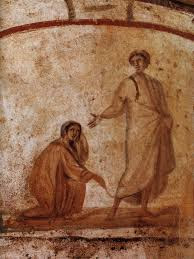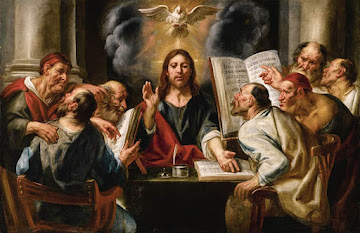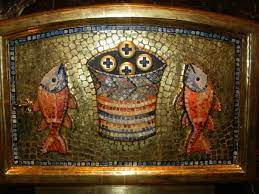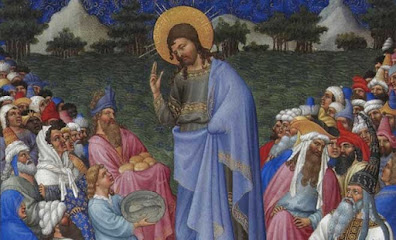There is some potential for scandal in today’s Gospel reading. We seem to get a different picture of Jesus than the loving, welcoming, compassionate, healing Savior that we encounter in other places in the Gospels. What parent could not identify in profound sympathy with the anguish of this woman who is simply trying to do whatever it takes for her daughter to be well? Yet Jesus and His disciples rebuff her several times. It looks like Jesus is not even living up to the teachings of loving His neighbor or blessing His enemies (Canaanites and Israelites having nothing less than a contentious history). Our neighbor, as we learn in the parable of the Good Samaritan, is everyone. Jew, Samaritan, and Gentile. I believe that these passages ask us to take a closer look. If we do, a profound outpouring of divine grace appears.
We learn that Jesus withdrew to Tyre and Sidon. This was a pagan gentile territory. I think a fair presupposition for Jesus’ perfect life and ministry is that nothing happens by accident. More precisely, it is not a random act that brings Jesus to gentile territory on several occasions. He is doing the perfect will of the Father.
If we hearken to the Old Testament, we learn that God chose Israel to be an instrument of His grace to the world. No Old Testament prophet says this better than Isaiah. Isaiah 49:6 says “It is too small a thing for you to be my servant to restore the tribes of Jacob and bring back those of Israel I have kept. I will also make you a light for the Gentiles, that my salvation may reach to the ends of the earth.” Importantly, this verse refers to the Servant of the Lord. The Servant here was understood by the earliest Christians, who were all Jewish, to not simply reference Israel in the abstract but a particular individual. Jesus the Messiah. Today’s Old Testament reading from Isaiah tells of the foreigners who join themselves to the LORD and become His servants will be brought to the Holy Mountain. This reading is best understood in an eschatological sense, coming to perfection at the consummation of the present Age but asymptotically approaching until that time by the power of the Incarnation.
Christ being present in a Gentile territory is momentous because it represents an important step in the Gentiles being grafted into the tree of Israel. Yes, Jesus is in Tyre and Sidon for a reason. He is the light to those nations. The light is present there, His illumination is a harbinger. Still, why does it not seem to shine brightly on everyone there in this passage, especially the anxious woman?
We can easily lose sight of the fact that Jesus did many things for the sake of posterity. It seems reasonable to think that He desired future generations, those who would receive the faith handed down from the Apostles, to know about the faith of this Canaanite woman. Further, St. Augustine famously said that God wants us to persist in prayer, for our own sake. The way I understand this is that God may will to answer our prayer in the affirmative, but He wills to answer not the first but the 1,501st. If we couple these two ideas together, the passage now leaps off the page.
What we see in the Canaanite woman, much like the gentile Syro-Phoenician woman, is that she persists in her faith. She is undeterred despite the rebukes. She continues to plead with the Lord and His disciples. We can perhaps surmise that she has run out of options. With no place to turn, she turns to the Jewish holy man who has reportedly done many signs and wonders. Or, it could be that she had a thirst for God. She knows something dark has come over her daughter that is beyond any natural cure. The spiritual/physical condition befalling the daughter can only be healed by light. Somehow, the mother knows this. We certainly resonate with the deep love she has for her daughter. What truly loving parent, we think, would not do everything for their child? Such a thought can only come from a position of love. God is love and the love any creature has, if it is indeed the agape love of willing the good of the other, originates in God.
The petitions from the Canaanite woman betray a desire for the living God. She provides an example for all everyone by asking the Lord to have pity on her, to help her, and that merely the scraps from the table are sufficient. This could be a model prayer in itself. The woman knows that she is not owed anything from God. No creature has a claim on the Creator. She therefore humbly asks the Lord for grace. Grace in the most common parlance is unmerited favor.
Still, why does Jesus rebuke the woman? First, to test the genuineness of her faith. There are many times in the Bible where we see tests of faith. For our sake, God wants to burn away the dross from our souls until the pure metal of refined faith remains. The Lord desires our hearts, minds, and the totality of our being. When we go to Him in prayer, it seems fair that He would want to know if we really desire Him above all else. Is it God we really want for Himself, or do we want Him simply as a means to an end? I think we see that the woman sought the Lord out of a pure heart, as evidenced by her humility.
Secondly, perhaps knowing the woman’s faith was genuine, Jesus' verbal rebuke redounds to the benefit of those in the audience and for the sake of all who would learn of the account afterward. It was a teaching moment. There may even be times that parents have done this with their children. We take an extra second when they are asking or telling us something to peer into their soul. The way that we ask a question can communicate a great deal to the other person. Jesus relays the chronology of His mission. He first comes to the lost sheep of Israel. During this time there are brief, though significant, interludes into Samaritan and Gentile territory. The Apostles will then later take the Gospel in the power of the Holy Spirit to the ends of the earth, baptizing all nations. The light is Christ, carried by His followers. Thus, Christ is very much present to the Gentiles, even after His ascension.
One might think that in this passage Jesus calls the woman a dog, which is a perjorative reference to Gentiles. However, the context does not fit well with this interpretation. He is not just letting her know that Jews think Gentiles are dogs. I think the Lord is intimating the potential for risk in taking something good, like the wonderful grace of healing, and providing it in such a way that it would be trampled underfoot, abused, or taken for granted would be profane (think about Jesus opponents accusing Him of casting out demons by the prince of demons). The woman responds that the food scraps are sufficient and have great value; which we might understand as follows: there is nothing wasted in the giving of grace. Isaiah 55 tells us that God’s word does not return void. This must be true of anything done by the divine Word, Jesus Christ. There is no wasted divine action. On some level, the woman realizes that only a word from the Lord will heal her daughter. Even a scrap of grace is enough to get us through the hardest of times. In another place, Jesus warns against casting pearls before swine. There are certain situations where a hostile or unholy audience will try to trample upon or defame the grace of God. We must be wise to this. Yet, the woman in today’s passage clearly shows where the lines of delineation are between genuine, persistent faith and folly.
Let us recognize the great example of faith, persistence, and love that the Canaanite woman exhibits and seek to emulate this in our own lives. May we receive God’s grace with humility and seek to share it with others. And may we be vigilant in our prayers for God to help those in most need of His mercy.
x


























